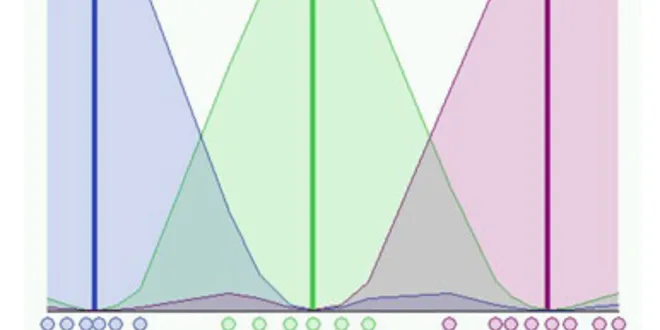Data Science & Developer Roadmaps with Chat & Free Learning Resources
Fuzzy-C-Means
Fuzzy C-Means (FCM) is an unsupervised clustering algorithm that allows data points to belong to multiple clusters with varying degrees of membership. Unlike traditional hard clustering methods, where each data point is assigned to a single cluster, FCM assigns a probability value between 0 and 1 to indicate the likelihood of a data point’s association with each cluster. This soft clustering approach is particularly useful for datasets with overlapping clusters, as it provides a more nuanced understanding of data distribution. FCM iteratively updates cluster centers and membership values to minimize the weighted distances between data points and cluster centers, enhancing clustering accuracy.

Fuzzy C-Means Clustering with Python
Fuzzy C-means clustering algorithm is an unsupervised learning method. Before learning the details, let me first decipher its fancy name. So, “fuzzy” here means “not sure”, which indicates that it’s…
📚 Read more at Towards Data Science🔎 Find similar documents

What is Fuzzy Clustering
Fuzzy clustering aims to solve the problem of one-to-many clustering and is a technique that assigns a degree of membership to each data point for each cluster, rather than assigning it to a single cl...
📚 Read more at Towards AI🔎 Find similar documents

Fuzzy Systems: Life between the 1’s and 0's
Fuzzy Systems is a branch of Computational Intelligence hoping to represent the uncertainty of a fuzzy, uncertain world. Fuzzy systems find their inspiration in the imprecision of human language…
📚 Read more at Towards Data Science🔎 Find similar documents

FuzzyWuzzy — the Before and After
In the previous article, I introduced FuzzyWuzzy library which calculates a 0–100 matching score for a pair of strings. The different FuzzyWuzzy functions enable us to choose the one that would most…
📚 Read more at Towards Data Science🔎 Find similar documents

Natural Language Processing for Fuzzy String Matching with Python
In computer science, fuzzy string matching is the technique of finding strings that match a pattern approximately (rather than exactly). In another word, fuzzy string matching is a type of search…
📚 Read more at Towards Data Science🔎 Find similar documents

Fuzzy sets & Fuzzy C-Means Clustering Algorithm
All the classification algorithms that we studied in the past, most of them are based on soft-based computation. Soft based computation means as we are giving the prediction from algorithm that point…...
📚 Read more at Analytics Vidhya🔎 Find similar documents

Type-2 Fuzzy Sets
In a previous post, we have seen how we use a fuzzy set of type-1 when we cannot determine the membership of an element as 0 or 1. We can extend this concept when the circumstances are so fuzzy that…
📚 Read more at Towards Data Science🔎 Find similar documents

Comparing Python’s Top Tools for Fuzzy Matching: PyFuzzy, FuzzyWuzzy, RecordLinkage, and RapidFuzz
Fuzzy matching is a process of matching records in a dataset that have similar, but not necessarily identical data. This type of matching is especially useful when dealing with large datasets, as it…
📚 Read more at Python in Plain English🔎 Find similar documents

Understanding a Use Case of Fuzzing in Go
Fuzzing in action Photo by Tim Hüfner on Unsplash “Fuzz testing is a novel way to discover security vulnerabilities or bugs in software applications.” The concept of fuzzing was introduced in 1988, w...
📚 Read more at Better Programming🔎 Find similar documents

Fuzz-testing
A subcategory of DAST tools, fuzz-testing checks the behavior of your application when confronted with invalid, unexpected, random, or maliciously formed data. Such checks can be especially useful whe...
📚 Read more at Software Architecture with C plus plus🔎 Find similar documents

Fuzzy matching at scale
Update December 2020: A faster, simpler way of fuzzy matching is now included at the end of this post with the full code to implement it on any dataset Data in the real world is messy. Dealing…
📚 Read more at Towards Data Science🔎 Find similar documents

Fuzzy Buzzy: Sussing Out the “Fuzzy Logic” of Buzzwords in Data Science
Disclaimer: This post does not involve the actual Fuzzy Logic. The term was originally intended as just a pun, but I later realised that it also demonstrates how the improper use of buzzwords can be…
📚 Read more at Towards Data Science🔎 Find similar documents

